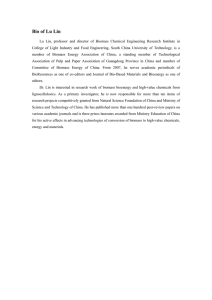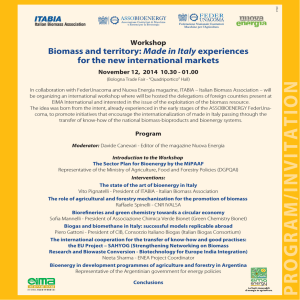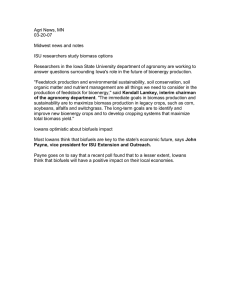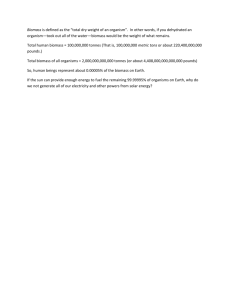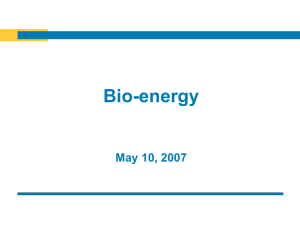Course Form
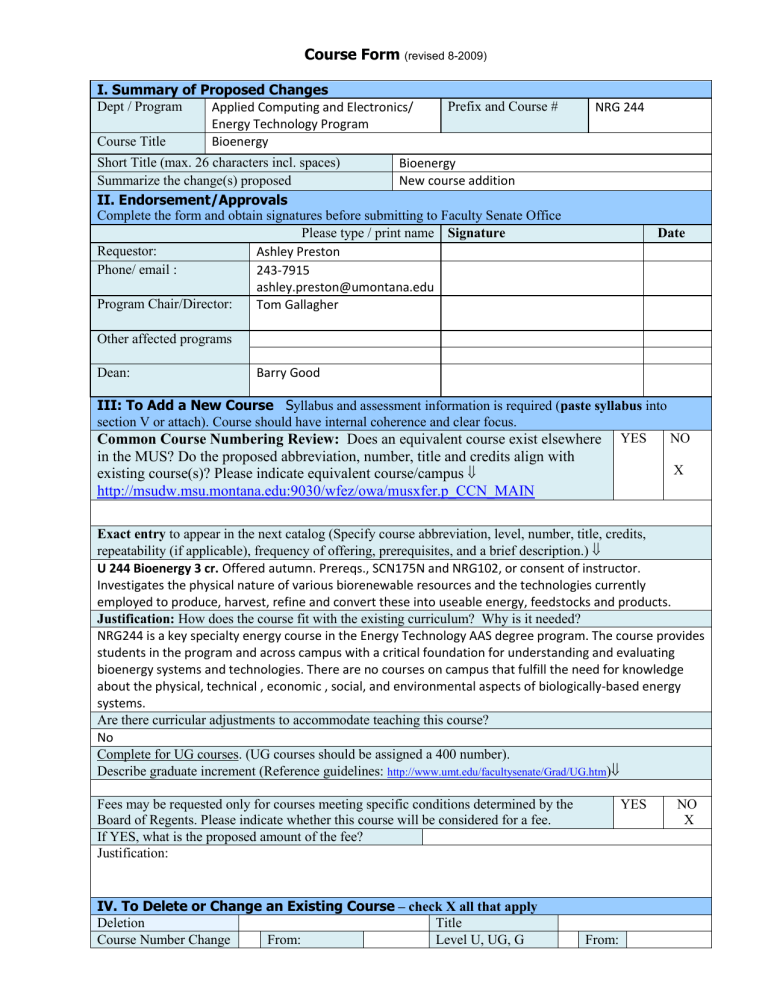
Course Form
(revised 8-2009)
I. Summary of Proposed Changes
Prefix and Course # Dept / Program Applied Computing and Electronics/
Energy Technology Program
Course Title Bioenergy
NRG 244
Short Title (max. 26 characters incl. spaces)
Summarize the change(s) proposed
II. Endorsement/Approvals
Bioenergy
New course addition
Complete the form and obtain signatures before submitting to Faculty Senate Office
Please type / print name Signature Date
Requestor: Ashley Preston
Phone/ email :
Program Chair/Director: Tom Gallagher
Other affected programs
243-7915 ashley.preston@umontana.edu
Dean: Barry Good
III: To Add a New Course S yllabus and assessment information is required ( paste syllabus into section V or attach). Course should have internal coherence and clear focus.
Common Course Numbering Review: Does an equivalent course exist elsewhere in the MUS? Do the proposed abbreviation, number, title and credits align with existing course(s)? Please indicate equivalent course/campus
YES NO
X
http://msudw.msu.montana.edu:9030/wfez/owa/musxfer.p_CCN_MAIN
Exact entry to appear in the next catalog (Specify course abbreviation, level, number, title, credits, repeatability (if applicable), frequency of offering, prerequisites, and a brief description.)
U 244 Bioenergy 3 cr. Offered autumn. Prereqs., SCN175N and NRG102, or consent of instructor.
Investigates the physical nature of various biorenewable resources and the technologies currently employed to produce, harvest, refine and convert these into useable energy, feedstocks and products.
Justification: How does the course fit with the existing curriculum? Why is it needed?
NRG244 is a key specialty energy course in the Energy Technology AAS degree program. The course provides students in the program and across campus with a critical foundation for understanding and evaluating bioenergy systems and technologies. There are no courses on campus that fulfill the need for knowledge about the physical, technical , economic , social, and environmental aspects of biologically-based energy systems.
Are there curricular adjustments to accommodate teaching this course?
No
Complete for UG courses. (UG courses should be assigned a 400 number).
Describe graduate increment (Reference guidelines: http://www.umt.edu/facultysenate/Grad/UG.htm
)
Fees may be requested only for courses meeting specific conditions determined by the
Board of Regents. Please indicate whether this course will be considered for a fee.
If YES, what is the proposed amount of the fee?
Justification:
YES NO
X
IV. To Delete or Change an Existing Course
– check X all that apply
Deletion Title
Course Number Change From: Level U, UG, G From:
To: To:
Description Change
Change in Credits From:
To:
Prerequisites
1. Current course information at it appears in catalog
( http://www.umt.edu/catalog )
Repeatability
Cross Listing
(primary program initiates form)
Is there a fee associated with the course?
2. Full and exact entry (as proposed)
3. If cross-listed course: secondary program & course number
4. Is this a course with MUS Common Course Numbering? If yes, then will this change eliminate the course’s common course status? Please explain below.
5. Graduate increment if level of course is changed to UG.
Reference guidelines at: http://www.umt.edu/facultysenate/Grad/UG.htm
(syllabus required in section V)
Have you reviewed the graduate increment guidelines? Please check (X) space provided.
6. Other programs affected by the change
7. Justification for proposed change
V. Syllabus/Assessment Information
Required for new courses and course change from U to UG. Paste syllabus in field below or attach and send digital copy with form.
NRG244 Bioenergy
Syllabus
Course Number:
Course Title:
Instructor:
NRG244
Bioenergy
Brian Kerns
Contact Information: Brian.Kerns@umontana.edu
; 532-3228
Office Hours:
Course Description:
U NRG244 Bioenergy 3 cr. investigates the physical nature of various bioenergy resources and the technologies currently employed to produce, harvest, refine and convert these into energy, feedstocks and products.
Course Overview:
Plants, both terrestrial and aquatic, macro and microscopic, inhabit most regions of the globe and thrive by capturing some of the limitless energy of the sun. This solar energy stored within plants can be harnessed to help fuel mankind’s industry. Since biomass is ubiquitous and renewable, it could potentially provide a significant share of the world’s energy needs. There are significant hurdles to overcome, however, as cultivating and processing biomass can be expensive. Also, since biomass is hydrocarbon-based, its utilization will generate carbon dioxide, a greenhouse gas. This class will broadly investigate the issues surrounding biorenewable resources and the technologies that are currently being employed.
Prerequisites:
Integrated Physical Sciences (SCN 175N), Intro to Energy Systems II (NRG 102) or consent of instructor.
Textbook:
Biorenewable Resources Engineering New Products from Agriculture, 1 st Ed. (2003), by Robert C. Brown,
Wiley-Blackwell Publishing ISBN 0-8138-2263-7.
Course Objectives:
This course helps satisfy the following objectives in the Energy Technology Program:
1.
2.
3.
Understand the basics of energy production, delivery, consumption, and waste disposal.
Comprehend traditional, alternative, and sustainable energy production technologies.
Evaluate energy production sites.
4.
5.
Design, install, maintain, and manage energy systems.
Assess societal, economic, environmental, ethical, and legal impacts of energy systems.
As an upper level course in the Energy Technology Program, more computational rigor will be required from students and the homework problems will be designed to develop these skills. Also, at this point in the student’s studies, practical applications and the synthesis of knowledge and acquired skills is very important and that is the focus of the field trip and term paper. Students must investigate, select, visit, interview and report upon a biorenewable project of their choosing.
Course Outcomes:
1.
Broad comprehension of biorenewable resources and the conversion technologies.
2.
Knowledge of the chemical and physical foundations of the biomass industry.
3.
Field experience of a commercial biomass facility.
4.
Environmental assessment of biomass technologies.
5.
Economic considerations of the biomass industry.
Important notice for this web-based class:
With the exception of an independent field trip requirement, this class is completely web-based. Students are required to have the necessary computer knowledge and manipulation skills. Students should consult the UM On-line webpage ( http://umonline.umt.edu/StudentInfo/ ), take the Blackboard tutorial, and complete the readiness assessment ( http://umonline.umt.edu/StudentInfo/readiness.htm
) to gage how successful the student may be in the on-line environment. On-line classes are a uniquely different learning experience that demands sufficient student self-motivation. The class will be paced; that is the instructor will only make available instructional material and tests as the class advances along as a unit. Older material may be removed and will be inaccessible. DO NOT MAKE THE COMMON MISTAKE THAT YOU CAN
WAIT UNTIL THE CLOSING WEEKS OF THE SEMESTER TO CRAM-COMPLETE THIS COURSE AS PRIOR
MATERIAL WILL NOT BE AVAILABLE TO YOU AND YOU WILL FAIL. Students MUST log in to this class and report your presence to the instructor within the first week of class. Email correspondence will be only through official UM email addresses. Students should consult the webcourse daily for new announcement, assignments, etc. I try to make all reasonable accommodations to students but you must inform me IN
ADVANCE about conflicts or any other issue that impedes your progress through the class. Once the class completes exams or homework problems, I will post feedback in a public announcement and at that point, it will not be possible to make-up for the exam or assignment.
Drop/Add Policy http://www.umt.edu/catalog/policy_procedure.htm
Academic Honesty Policy
All students must practice academic honesty. Academic misconduct is subject to an academic penalty by the course instructor and/or a disciplinary sanction by the University.
All students need to be familiar with the Student Conduct Code. The Code is available for review online at http://www.umt.edu/SA/VPSA/index.cfm?page?1321
.
Students with disabilities
Students with disabilities will receive reasonable accommodations in this online course. To request course modifications, please contact me as soon as possible. I will work with you and Disability Services in the
accommodation process. For more information, visit the Disability Services website at http://www.umt.edu/dss/ or call 406.243.2243 (Voice/Text).
Topics:
UNIT 1. INTRODUCTION.
1.1 Definitions
1.2 History
1.3 Why Biomass
1.4 Challenges
UNIT 2. FUNDAMENTAL CONCEPTS IN UNDERSTANDING THE BIOMASS INDUSTRY.
2.1 Introduction
2.2 Thermodynamics
2.3 Organic chemistry
2.4 Chemistry of plant matter
UNIT 3. THE BIOMASS RESOURCE BASE.
3.1 The resource
3.2 Properties
3.3 Yields
3.4 Size of resource base
UNIT 4. PRODUCTION OF BIOMASS RESOURCES.
4.1 Introduction
4.2 Herbaceous crops
4.3 Woody crops
4.4 Storage
4.5 Transgenic crops
UNIT 5. PRODUCTS FROM BIOMASS RESOURCES.
5.1 Introduction
5.2 Bioenergy
5.3 Transportation fuels
5.4 Chemicals
5.5 Fibers
UNIT 6. CONVERSION OF BIOMASS RESOURCES INTO HEAT AND POWER.
6.1 Introduction
6.2 Direct combustion
6.3 Thermal gasification
6.4 Anaerobic digestion
UNIT 7. PROCESSING OF BIOMASS RESOURCES INTO CHEMICAL AND FUELS.
7.1 Introduction
7.2 Fermentation of sugars and starches
7.3 Conversion of lignocellulosic feedstocks to sugar
7.4 Lipid extracts
7.5 Thermochemical conversion
7.6 Other processes
UNIT 8. PROCESSING OF BIOMASS RESOURCES INTO NATURAL FIBERS.
8.1 Introduction
8.2 Mechanical pulping
8.3 Chemical pulping
8.4 Depithing
UNIT 9. ENVIRONMENTAL ASPECTS.
9.1 Introduction
9.2 Plants
9.3 Production
9.4 Processing
9.5 Utilization
UNIT 10. ECONOMICS OF BIOMASS RESOURCES.
10.1 Introduction
10.2 Feedstock costs
10.3 Manufacturing costs
Grade Determination:
Unit Exams (10 exams, 10 pts each)
Discussion Postings (12 postings, 3 pts each)
Field Trip and Class Paper
Homework Problems (10 probs., 5 pts each)
Final Comprehensive Exam
Total
Points
100
36
100
50
35
321
Grade Total Points
A
B
289≤x
257≤x<289
C
D
225≤x<257
193≤x<225
F x<193
Course Schedule:
Week Monday’s
Date
1
2
3
4
5
6
7
8
9
10
11
12
13
8/31
9/7
9/14
9/21
9/28
10/5
10/12
10/19
10/26
11/2
11/9
11/16
11/23
Learning Unit
Introductions
Unit 1
Unit 2
Unit 2
Unit 3
Unit 4
Unit 5
Unit 6
Unit 7
Unit 8
Unit 9
Field trip/Term Paper
Thanksgiving break
Postings due by midnight
9/2
9/9
9/16
9/23
9/30
10/7
10/14
10/21
10/28
11/4
11/10
Homework due by midnight
9/17
9/24
10/1
10/8
10/15
10/22
10/29
11/5
11/12
Term paper due by 11/23
Unit exams
Due by midnight
9/7
9/28
10/5
10/12
10/19
10/26
11/2
11/9
11/16
14
15
11/30
12/7
Unit 10
Review
12/2 12/3 12/7
16 12/14 Finals Week 12/14
Prepared by: Brian Kerns
Updated: June 8, 2009
VI Department Summary
(Required if several forms are submitted) In a separate document list course number, title, and proposed change for all proposals.
VII Copies and Electronic Submission.
After approval, submit original, one copy, summary of proposals and electronic file to the Faculty Senate Office, UH 221, camie.foos@mso.umt.edu.
